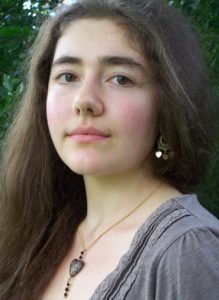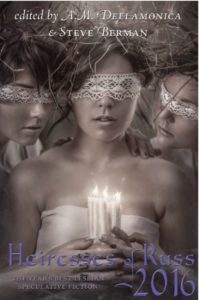
Faith Mudge
Faith Mudge is a writer from Queensland, Australia, with a passion for fantasy, folk tales and mythology from all over the world – in fact, for almost anything with a glimmer of the fantastical. Her stories have appeared in various anthologies, including Kaleidoscope, Cranky Ladies of History, Hear Me Roar and Daughters of Frankenstein: Lesbian Mad Scientists
. She posts reviews and articles at beyondthedreamline.wordpress.com, and can also be found at beyondthedreamline.tumblr.com.
Is there a literary heroine on whom you imprinted as a child? A first love, a person you wanted to become as an adult, a heroic girl or woman you pretended to be on the playground at recess?
I can’t remember how old I was when I first read Jane Eyre, but I’m pretty sure it was in my early teens, around the point when I was devouring so many other classic novels that my written vocabulary started to sound like a teenage Victorian, the kind of prose that’s less purple and more a really annoying shade of magenta. I do not now like a lot of those books, but I’m always going to have a certain residual fondness. They were what I needed at the time.
Jane Eyre was different. It’s a favourite of my mother’s, so the copy I read was hers. These days I have two of my own, just to be safe. I’m lucky – mine was a childhood filled with stories and I had a small army of heroines to look up to, all of whom have contributed to who I am in different ways. It’s hard to pick just one! But Jane Eyre
is one of those books that leaves a strong impression every time I re-read it, reminding me of just how good it is. The writing is decisive and elegant, the plot is strong. And most of all, I love Jane. She remains one of my favourite characters in anything ever.
Can you remember what it was she did or what qualities she had that captured your affections and your imagination so strongly?
Oh, that’s easy. Jane is indomitable. She starts out as this fierce, desperate little girl who craves love more than anything and grows into a woman with a quiet, cool exterior who is an absolute force of nature underneath, a woman who is strong enough to walk away from love when it isn’t good for her. She is an extraordinary balance of calm head and passionate heart, with a rich inner life that she doesn’t share with people who don’t deserve it. In the depths of her despair, she decides that she will care for herself – which is a tremendously powerful statement that has always stuck with me. How many heroines, even now, are allowed to say that? The prickly edges of Jane and Rochester’s personalities mostly work together very well, but she’s only ever in his life on her terms and he’s very much aware of that. I detest St John, not just for being the unrelentingly unpleasant person that he is, but for getting at Jane’s weak point, which is a strong sense of duty that can be turned against her. She’s also a very loving person, amazingly non-judgemental given the times when she lived, and she doesn’t need to be pretty or socially important to have a story worth telling – or to be worth loving in return.
How does she compare to the female characters in your work? Is she their literary ancestor? Do they rebel against all she stands for? What might your creations owe her?
All my characters are very different people, of course, but that indomitability, that strength of will, is definitely a trait carried throughout my work. I like writing about women who say no. The complexity of duty and how to define your own moral compass, what we owe the people in our lives and what we owe ourselves, are big themes in Jane Eyre and often weave themselves into my stories as well. Jane is a complicated woman making difficult decisions and she’s never dismissed or punished by the narrative for being the person that she is. I love that. I try to treat my protagonists with the same respect.
How do you feel about the word heroine? Does the word heroine have a purpose that isn’t served equally well by hero?
There does seem to be a trend towards the disuse of feminised words and that really bothers me. As a society, we need gender-neutral terminology. That’s very important. But it’s a big language! There is enough space for gendered terms as well, if they are useful, and I think the word ‘heroine’ is very useful. What’s wrong with a word that says, unequivocally, ‘I am a woman and I am amazing’? There are plenty of specifically feminine insults. Why not build up a lexicon of strength?

About this post: The Heroine Question is my name for a series of short interviews with (mostly) female writers about their favorite characters and literary influences. Clicking the link will allow you to browse all the other interviews, with awesome people like Linda Nagata, Kay Kenyon, and S.B. Divya. If you prefer something more in the way of an actual index, it’s here.



Pingback: On Heroines | Beyond the Dreamline